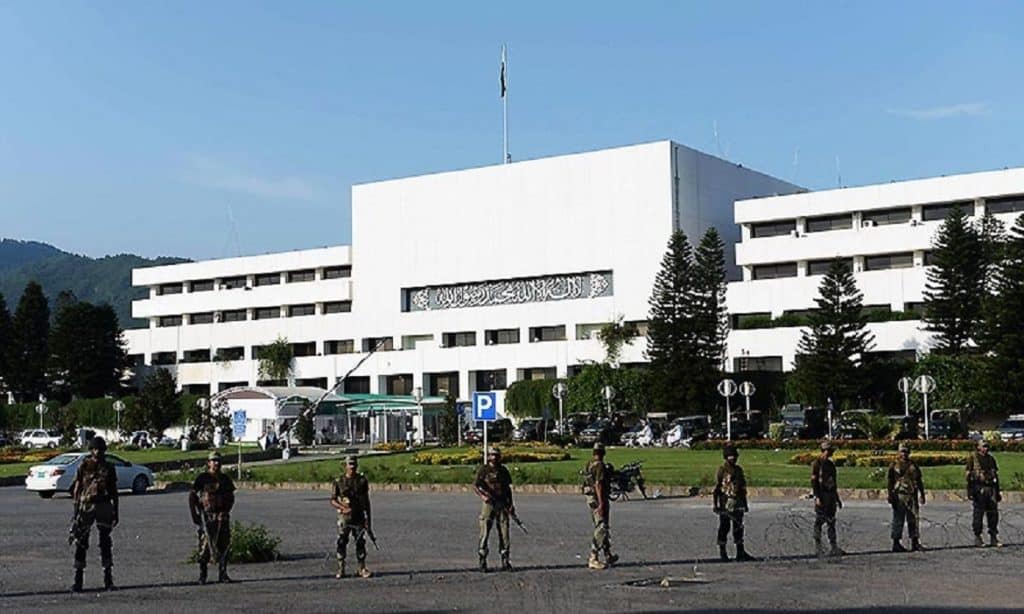By Hafiz Muhammad Sheraz
Pakistan is currently facing political chaos. Behind this political bickering are those parties that have neither plans nor visions but wish to rule. It is a bitter reality: democracy is a short interregnum between quasi and full rule by the Pakistani military.
Arguably, democracy is a very gradual and painful transition process that countries adopt through socio-cultural acceptance, mutual commitment and popular will, with the help of various democratic ideals, such as constitutional supremacy, inclusive pluralism and rule of law. In Pakistan, as in other nations, this process is slow and extremely painful.
Historically, since gaining independence from Britain, the nation has been ruled by a group of oligarchs commonly known as the establishment, which includes not only the Pakistani military and agencies, but also the ruling families and landowners who enjoyed many favors from the British. The corporate sector, bureaucracy, and judiciary can also be included. In addition to this, the state was in the shackles of dictatorships, which blocked the transition to democracy. Nevertheless, the democratization process has gained momentum due to the awareness of civil society, which has gathered from social media and articles books and media channels by neutral authors, etc. In addition, military and economic development through inclusion in the economic and political institutions of the West also played a key role in the democratization of Pakistan. In this regard, they have influenced Pakistani society through their political culture.
Moreover, democracy has gained some value in Pakistan, but not the levels of democratic values of Western nations. Although the United States, the largest liberal, pluralistic and vibrant democracy in the West, has overthrown democratically elected governments, it currently neither wants to strengthen democracy in Pakistan nor weaken it. Historically, one can blame the West, but in the current scenario, why has democracy not taken firm root in Pakistan’s political system? There are many reasons behind this problem. Some are discussed below.
First, there is no awareness of having to listen and speak tolerantly, because educational institutions are full of hate literature. The political elite spreads hate in politics. Second, schools, colleges and universities lack the capacity to develop critical thinking. The third negative aspect is that intellectuals and philosophers fall into three categories:
1 – A group of intellectuals, who favor the status quo, can be called indirect partners of the security and state establishment.
2 – Those who do not favor the status quo but follow the rule of anti-democratic forces. They can be called “followers of the ruling forces.”
3 – A group of philosophers who challenge the state through their critical thinking and writing books, columns and articles that develop logical thinking. They are known as democracy challengers. Ironically, they are a minority.
Furthermore, the security establishment in particular, the judiciary and the bureaucracy in general do not want to compromise their interests.
The political elites, like the political thinkers, can be also divided into two groups:
First, those political parties that follow the status quo during the rule of their regime. But after the end of their government, they oppose the establishment. Such as the Pakistan People’s Party (PPP), the Pakistan Muslim League Nawaz (PMLN) and the Pakistan Tehreek-E-Insaf (PTI).
Second, those parties that unabashedly follow the policies of the Pakistan Army; the biggest example in this regard is the Pakistan Muslim League Quaid-E-Azam (PMLQ).
Finally, the state does not respect or preserve all national identities. As a result, various militant organizations such as the Baloch Liberation Army (BLA) and the Tehreek-E-Taliban Pakistan (TTP), etc., are springing up. The failure to implement the 18th Amendment of the Constitution of Pakistan and the lack of distribution of resources and power are creating an anarchic situation. As a result, corruption is on the rise and urbanization has burdened the cities.
The road ahead
Pakistani democracy can be purified through the following mechanisms.
First, all educators must encourage and adopt tolerant behavior and critical thinking. Second, all intellectuals must resolve their huge disputes through logical debates. Third, all educational institutions must motivate all philosophers in this regard. They must conduct discussions and seminars.
Fourth, all major institutions must compromise on their interests; they must respect constitutional limits. The state must preserve and respect all identities of all nations. All institutions must implement political and economic reforms and follow the restructuring process to create inclusive political and economic institutions. Fifth, all political forces must unite against all anti-democratic forces to ensure constitutional and civil supremacy. As a result, the middle class will not only emerge but also build political space and democracy will eventually prevail.
Finally, the establishment should be prevented from interfering politically through a new social contract. The media must play a key role in the inclusion of the country. They must counter all anti-democratic forces and highlight how democracy is probably the best political system in the world. Otherwise, Islamabad’s future will be dark. Another debacle like the one in East Pakistan could happen again.
Hafiz Muhammad Sheraz – Independent researcher, expert in diplomacy, international political economy and global order, with a degree in international relations from the University of Balochistan.
(The opinions expressed in this article are solely those of the author and do not necessarily reflect the views of World Geostrategic Insights)
Image Source: AFP







